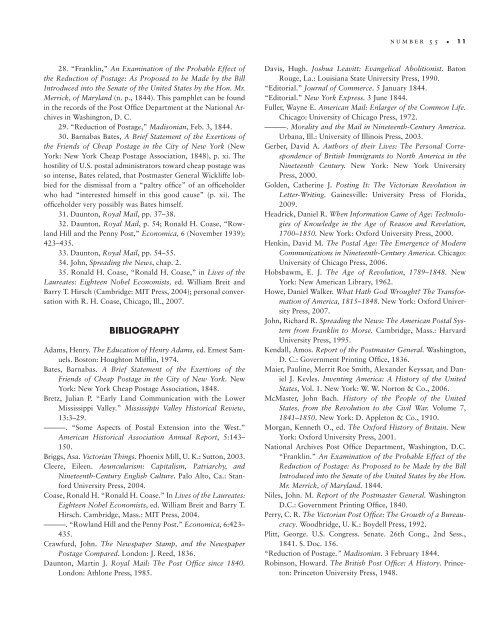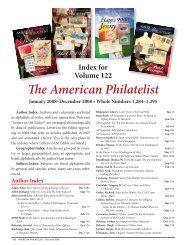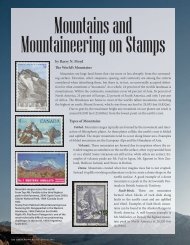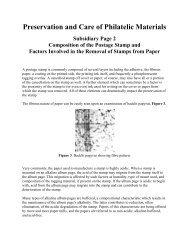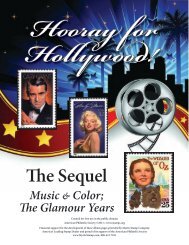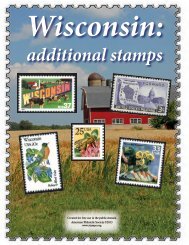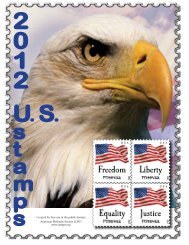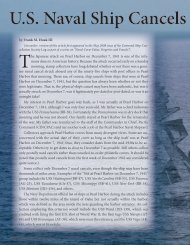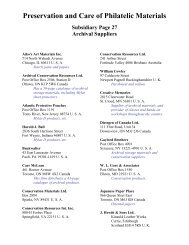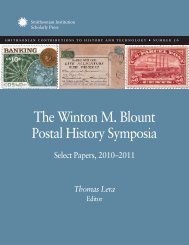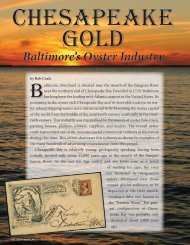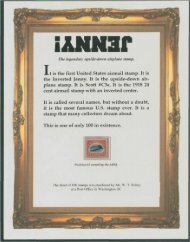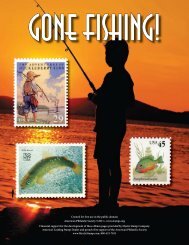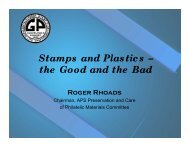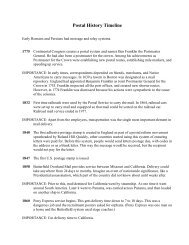The Winton M. Blount Postal History Symposia - Smithsonian ...
The Winton M. Blount Postal History Symposia - Smithsonian ...
The Winton M. Blount Postal History Symposia - Smithsonian ...
- No tags were found...
You also want an ePaper? Increase the reach of your titles
YUMPU automatically turns print PDFs into web optimized ePapers that Google loves.
n u m b e r 5 5 • 1 128. “Franklin,” An Examination of the Probable Effect ofthe Reduction of Postage: As Proposed to be Made by the BillIntroduced into the Senate of the United States by the Hon. Mr.Merrick, of Maryland (n. p., 1844). This pamphlet can be foundin the records of the Post Office Department at the National Archivesin Washington, D. C.29. “Reduction of Postage,” Madisonian, Feb. 3, 1844.30. Barnabas Bates, A Brief Statement of the Exertions ofthe Friends of Cheap Postage in the City of New York (NewYork: New York Cheap Postage Association, 1848), p. xi. <strong>The</strong>hostility of U.S. postal administrators toward cheap postage wasso intense, Bates related, that Postmaster General Wickliffe lobbiedfor the dismissal from a “paltry office” of an officeholderwho had “interested himself in this good cause” (p. xi). <strong>The</strong>office holder very possibly was Bates himself.31. Daunton, Royal Mail, pp. 37–38.32. Daunton, Royal Mail, p. 54; Ronald H. Coase, “RowlandHill and the Penny Post,” Economica, 6 (November 1939):423–435.33. Daunton, Royal Mail, pp. 54–55.34. John, Spreading the News, chap. 2.35. Ronald H. Coase, “Ronald H. Coase,” in Lives of theLaureates: Eighteen Nobel Economists, ed. William Breit andBarry T. Hirsch (Cambridge: MIT Press, 2004); personal conversationwith R. H. Coase, Chicago, Ill., 2007.BIBLIOGRAPHYAdams, Henry. <strong>The</strong> Education of Henry Adams, ed. Ernest Samuels.Boston: Houghton Mifflin, 1974.Bates, Barnabas. A Brief Statement of the Exertions of theFriends of Cheap Postage in the City of New York. NewYork: New York Cheap Postage Association, 1848.Bretz, Julian P. “Early Land Communication with the LowerMississippi Valley.” Mississippi Valley Historical Review,13:3–29.———. “Some Aspects of <strong>Postal</strong> Extension into the West.”American Historical Association Annual Report, 5:143–150.Briggs, Asa. Victorian Things. Phoenix Mill, U. K.: Sutton, 2003.Cleere, Eileen. Avuncularism: Capitalism, Patriarchy, andNineteenth- Century English Culture. Palo Alto, Ca.: StanfordUniversity Press, 2004.Coase, Ronald H. “Ronald H. Coase.” In Lives of the Laureates:Eighteen Nobel Economists, ed. William Breit and Barry T.Hirsch. Cambridge, Mass.: MIT Press, 2004.———. “Rowland Hill and the Penny Post.” Economica, 6:423–435.Crawfurd, John. <strong>The</strong> Newspaper Stamp, and the NewspaperPostage Compared. London: J. Reed, 1836.Daunton, Martin J. Royal Mail: <strong>The</strong> Post Office since 1840.London: Athlone Press, 1985.Davis, Hugh. Joshua Leavitt: Evangelical Abolitionist. BatonRouge, La.: Louisiana State University Press, 1990.“Editorial.” Journal of Commerce. 5 January 1844.“Editorial.” New York Express. 3 June 1844.Fuller, Wayne E. American Mail: Enlarger of the Common Life.Chicago: University of Chicago Press, 1972.———. Morality and the Mail in Nineteenth- Century America.Urbana, Ill.: University of Illinois Press, 2003.Gerber, David A. Authors of their Lives: <strong>The</strong> Personal Correspondenceof British Immigrants to North America in theNineteenth Century. New York: New York UniversityPress, 2000.Golden, Catherine J. Posting It: <strong>The</strong> Victorian Revolution inLetter- Writing. Gainesville: University Press of Florida,2009.Headrick, Daniel R. When Information Came of Age: Technologiesof Knowledge in the Age of Reason and Revelation,1700–1850. New York: Oxford University Press, 2000.Henkin, David M. <strong>The</strong> <strong>Postal</strong> Age: <strong>The</strong> Emergence of ModernCommunications in Nineteenth- Century America. Chicago:University of Chicago Press, 2006.Hobsbawm, E. J. <strong>The</strong> Age of Revolution, 1789–1848. NewYork: New American Library, 1962.Howe, Daniel Walker. What Hath God Wrought? <strong>The</strong> Transformationof America, 1815–1848. New York: Oxford UniversityPress, 2007.John, Richard R. Spreading the News: <strong>The</strong> American <strong>Postal</strong> Systemfrom Franklin to Morse. Cambridge, Mass.: HarvardUniversity Press, 1995.Kendall, Amos. Report of the Postmaster General. Washington,D. C.: Government Printing Office, 1836.Maier, Pauline, Merrit Roe Smith, Alexander Keyssar, and DanielJ. Kevles. Inventing America: A <strong>History</strong> of the UnitedStates, Vol. 1. New York: W. W. Norton & Co., 2006.McMaster, John Bach. <strong>History</strong> of the People of the UnitedStates, from the Revolution to the Civil War. Volume 7,1841–1850. New York: D. Appleton & Co., 1910.Morgan, Kenneth O., ed. <strong>The</strong> Oxford <strong>History</strong> of Britain. NewYork: Oxford University Press, 2001.National Archives Post Office Department, Washington, D.C.“Franklin.” An Examination of the Probable Effect of theReduction of Postage: As Proposed to be Made by the BillIntroduced into the Senate of the United States by the Hon.Mr. Merrick, of Maryland. 1844.Niles, John. M. Report of the Postmaster General. WashingtonD.C.: Government Printing Office, 1840.Perry, C. R. <strong>The</strong> Victorian Post Office: <strong>The</strong> Growth of a Bureaucracy.Woodbridge, U. K.: Boydell Press, 1992.Plitt, George. U.S. Congress. Senate. 26th Cong., 2nd Sess.,1841. S. Doc. 156.“Reduction of Postage.” Madisonian. 3 February 1844.Robinson, Howard. <strong>The</strong> British Post Office: A <strong>History</strong>. Princeton:Princeton University Press, 1948.


